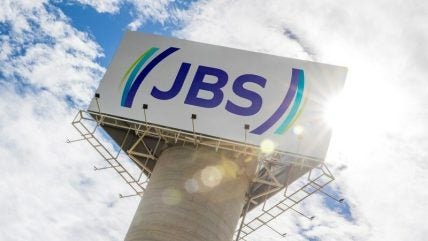
JBS has been accused by Mighty Earth of reneging on its environmental commitments as opposition to the meat giant’s planned US listing mounts.
The latest salvo to be fired at Brazil-based JBS by the earth protection advocacy group – and others – follows comments made by the company’s chief sustainability officer Jason Weller, who seemingly sought to distance the world’s largest meat processor from its 2040 zero-emissions pledge.

Discover B2B Marketing That Performs
Combine business intelligence and editorial excellence to reach engaged professionals across 36 leading media platforms.
In an interview with Reuters, Weller said JBS’ emissions goal was merely an “aspiration”. He also told the news agency: “It was never a promise that JBS was going to make this happen.”
Asked by Just Food to clarify those comments, the company issued a statement that suggested Weller may have stepped out of line. Mighty Earth CEO Glenn Hurowitz called the comments made by the sustainability chief “clumsy”.
“JBS takes its commitment to a more sustainable future for agriculture very seriously, and our climate ambitions have not changed,” the company responded. “Any assertion otherwise is completely untrue.”
Environmental groups have reportedly claimed that 97% of JBS’ greenhouse gas emissions come from external sources such as deforestation, biodiversity loss and pollution, Reuters reported, or so-called Scope 3 emissions.

US Tariffs are shifting - will you react or anticipate?
Don’t let policy changes catch you off guard. Stay proactive with real-time data and expert analysis.
By GlobalDataFor internally-occurring emissions, JBS seeks to reduce Scopes 1 and 2 “emission intensity” by 30% by 2030 using 2019 as a baseline, according to the company’s most recent annual sustainability report for 2023.
According to Reuters, JBS’ indirect emissions exclude those related to changes in land use, and so, Weller told the news agency, the company focuses on emissions internally.
“There is not an approved format today on how to calculate land-use-change emissions for which we have confidence,” Weller said.
Mighty Earth’s Hurowitz was highly critical.
“JBS’ comments are a clumsy attempt to evade any accountability and to wash its hands for its outsized impact on the planet, and its failure to deliver on its clear commitments,” he said in the NGO’s statement.
“For JBS to focus on the three per cent of its environmental impact that comes from internal operations, and not the 97% that comes from the meat it sources, is a clear sign that it is still not taking its impact on forests or climate seriously.”
In December, Mighty Earth issued a report pinpointing JBS as among a “terrible trio” due to its reported links to deforestation in Brazil, the other two being agri-food giants Cargill and Bunge.
JBS scored ten out of 100 in Mighty Earth’s Soy & Cattle Deforestation Tracker, compared to 11 for Cargill and 31 for Bunge.
Hurowitz added in the group’s latest statement: “JBS still doesn’t seem to particularly care where its meat comes from, or how it’s produced.
“The company’s admission that it doesn’t control its supply chain, even as competitors are making progress, shows why the US Securities and Exchange Commission shouldn’t allow this reckless company to access US capital markets through an IPO.”
In March last year, JBS was also struck off by the Science-Based Targets Initiative (SBTi), the global organisation that helps businesses set emissions reduction goals.
The meat processor was classified by SBTi as “commitment removed”.
JBS had outlined in its 2023 sustainability report, issued in September last year: “Our ambition to set near-term science-based goals in line with our net zero by 2040 ambition has not changed.
“More importantly, no matter the long-term goal, there are significant on-the-ground actions that must occur today, such as our comprehensive efforts to address the drivers of deforestation in the Amazon, if we are to preserve a resilient global agricultural system that works for farmers, consumers and the planet tomorrow.”
On deforestation, the report added: “Mitigating land-use change in JBS’ supply chains is our greatest opportunity for reducing indirect GHG emissions.”
Two weeks before the SBTi struck off JBS in March last year, New York State Attorney General Letitia James filed a lawsuit against the company’s US arm for allegedly making environmental claims that deceive customers.
James called on the New York County Supreme Court to demand JBS drop its 2040 net-zero pledge, arguing it had “repeatedly and persistently made unsubstantiated and misleading environmental marketing claims to New York consumers”.
However, according to a report yesterday (15 January) from Bloomberg, the New York Court dismissed the suit, although the news publication said the attorney general’s office intended to file an amended complaint.
JBS rounded off its statement sent to Just Food by saying: “JBS will continue to partner with farmers, ranchers and our food-system partners around the world to find ways to help feed a growing population, while using fewer resources and reducing agriculture’s environmental impact.
“Additionally, the New York Attorney General’s lawsuit against JBS was dismissed without prejudice by the court last week.”





